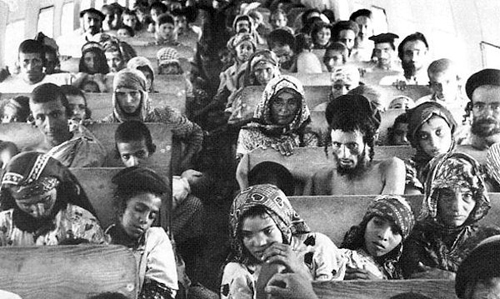
JERUSALEM (WJC) — On Sunday, Nov. 30, Israel officially remembered the suffering of an estimated 850,000 Jews who left, were expelled from, or fled from their homes in, Arab and other Muslim countries in the wake of the establishment of the State of Israel.
The national day of commemoration for Jewish refugees from Arab lands and Iran declared this summer by the Knesset, Israel’s legislature. The date has a special meaning – it is the day after 29 November, the day in 1947 that the United Nations General Assembly approved the partition plan for the Palestine Mandate and the creation of a Jewish state. November 30, the day after the decision, is the day the Arabs started their concerted attacks on Jews.Almost a million Jews lived in Arab and Muslim countries in 1948 when Israel was founded. The largest Jewish community was in Morocco, with 250,000 Jews. Today, only Iran, Tunisia and Morocco have still sizeable Jewish communities.
Like the World Jewish Congress, the organization Justice for Jews from Arab Countries has tried to raise international awareness of the issue, in order to ensure that in any future peace negotiations not only the Palestinian refugees would receive compensation, but also the Jewish refugees from Arab countries who were uprooted from their homes.
“Every time the world talks about refugees from the Middle East [they] only emphasize the Palestinian refugees. The fact is there were two populations of refugees,” Stanley Urman, founder of JJAC and its current executive vice president, told the newspaper ‘Haaretz’. The organization’s goal is make sure that the narrative of the suffering and rights of the Jews from Arab lands are also on the negotiating table, since they were also refugees as part of the same struggle, at the same time and in similar numbers, he said.
In recent years, Urman has been researching the UN’s activities concerning the refugees, and points out the lack of equality in the UN’s treatment of Palestinian and Jewish refugees. He counted 197 UN General Assembly and Security Council decisions between 1946 and 2014 concerning Palestinian refugees. Yet there is not a single UN resolution that emphasizes the suffering and rights of the Jews from Arab lands, he pointed out.
Israel’s Prime Minister Benjamin Netanyahu said in a statement: “We mark today for the first time the exodus and expulsion of hundreds of thousands of Jews from Arab countries and from Iran in the first years after the state of Israel was founded.
“It is not for nothing that this day is marked the day after November 29th – [when] the Arab countries that did not agree with the United Nations resolution establishing the Jewish state forced the Jews in their territory to leave their homes, leaving behind them their property. In some cases, the expulsion was carried out alongside pogroms and violence against Jews. We acted, and we’ll continue to act, so that they and their demands will not be forgotten.”
President Reuven Rivlin said at the commemorative ceremony that the State of Israel had erred when it behaved “paternalistically and condescendingly toward immigrants from Arab countries.” He called for a compensation arrangement for Jews who came to Israel from Arab lands, leaving considerable property and money behind.
The first-ever ceremony on the Day of Commemoration for Jewish Refugees from Arab countries and Iran was held at the President’s Residence in Jerusalem.
Rivlin also addressed the need to recognize the Jews’ suffering and “repair the historic injustice that was done to a million Jews, immigrants from Arab countries and Iran, whose history was pushed to the margins of the Zionist narrative. “Over the years, refugees from the Arabian communities felt that it was the [Israeli] establishment itself that was denying them their place; that it was the establishment itself that was obscuring evidence of their existence from the pages of the official history. It was as if they, the immigrants from Arab countries, had not walked proudly along the routes marked by the pillars of fire and smoke of our people’s history,” he said.
The president admitted that “For years their voices were not heard and their losses not given expression,” which could be explained, he added, because of the fact “that terrible tragedies that happened to our people grabbed most of the attention” – a reference to the Holocaust.
Rivlin said: “Their voices were silenced, but the words were on their lips all the time, even when they were said in accented Hebrew, Farsi, or Arabic – languages that were considered in Israel to be the language of the enemy, a source of shame.”
*
Preceding provided by World Jewish Congress